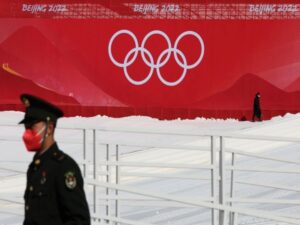 The Winter Olympics was opened by Chinese President Xi Jinping in Beijing on Friday 4 February with fireworks and a light show, in the absence of many of the world’s leaders who boycotted the event in protest against China’s human rights abuses which are seen as contrary to the spirit and ethos of the Olympics. While around the world protestors drew attention to China’s genocide and human rights abuses, and the inappropriateness of China being allowed to host the Games. China rejects the genocide charge which is driving the diplomatic boycott of the games by most Western nations.
The Winter Olympics was opened by Chinese President Xi Jinping in Beijing on Friday 4 February with fireworks and a light show, in the absence of many of the world’s leaders who boycotted the event in protest against China’s human rights abuses which are seen as contrary to the spirit and ethos of the Olympics. While around the world protestors drew attention to China’s genocide and human rights abuses, and the inappropriateness of China being allowed to host the Games. China rejects the genocide charge which is driving the diplomatic boycott of the games by most Western nations.
India announced her boycott of the opening ceremony at the eleventh hour when China’s domestic torch relay ceremony featured a Galwan People’s Liberation Army soldier as one of the torchbearers; India called the move “regrettable”, saying that China was choosing to “politicise the Olympics”. The recent Tibet-India border clash in Galwan against the Chinese PLA resulted in the loss of 20 Indian soldiers and clashes along the border continue.

Dilnigar Ilhamjan
Photo: Frontline / Twitter
Cross-country skier Dilnigar Ilhamjan, 20, a Uyghur from East Turkestan [Ch: Xinjiang] was the last athlete to carry the flame, along with her with Chinese teammate Zhao Jiawen. Normally regarded as an honour, this gesture has sparked anger in the Uyghur exile community. People in East Turkestan, like Tibetans, suffer under the Chinese régime there.
There are reports from China that dissidents and rights activists are being held by security police in locations away from their homes to prevent them from speaking out during the event, others have been effectively placed under house arrest and are under close surveillance.
In Tibet, Radio Free Asia reports that the authorities have “ramped up security controls[…] with police monitoring residents closely to block communications”. Their local source reports “Tibetans who have been to India […] are being summoned each day for questioning”, and continued, “Local Tibetans are terrified”.
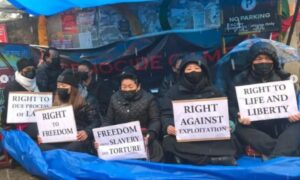
Tibetan NGOs in Dharamahala sit-in protest
The day of the opening ceremony was marked by protests around the world with Tibetans joining Uyghurs, Hong Kongers, Taiwanese, Southern Mongolians and human rights activists, all accusing the International Olympics Committee (IOC) of complicity in covering up mass human rights abuses by China. The protests follow months of campaigning to the international community to boycott or postpone the Olympics. In Dharamshala all the Tibet support and advocacy organisations jointly held a protest calling February 4 a “black day”. Ten activists in Dharamshala held a day-long hunger strike, while in New Delhi hundreds of Tibetans gathered with messages, “No Rights, No Games” and “Say No To Genocide Games”. Three were detained in prison for several hours before being released.
Virtual alternative Olympics opening ceremonies were held by rights groups advocating independence for their countries from China, and activists launched the #IWillNotWatch campaign which urges people to switch off and not watch the “Genocide Games”.
Protestors have been urging the world not to watch the “Genocide Games”, with a protest outside NBC headquarters urging them not to broadcast the Games. The Drum reported on February 8 “Record low BBC and NBC ratings as Winter Olympics audience dwindles […] Beijing’s Winter Olympics Ceremony now holds the lowest record for views in the US since NBC started broadcasting in 1988.In the UK meanwhile, the BBC’s coverage peaked at 1.3 million viewers, compared with 2.4 million for Pyeong Chang”. The Drum comments, “Viewing of Games is becoming increasingly fragmented across multiple platforms”.
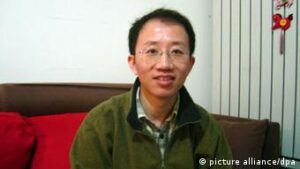
Hu Jia
The New York Times has reported that officials have warned Olympians that protest could bring prosecution. Hu Jia, a prominent human rights activist, who is confined to his apartment for the duration of the Games says the authorities were determined to quash any overt criticisms of the Games online. Their report also said that the Olympic events will take place in front of a “limited audience of screened spectators of China’s choosing” and that fences have been erected to keep people out of venues. Incoming athletes and their teams have been advised not to bring their own phones but to use temporary ones.
As the Games progress, reports are emerging of a clampdown on athletes whose social media postings do not comply with China’s wishes. The Tibetan Review reports that skier Katri Lylynpera was one of a number of Finnish athletes ordered to delete photos they had shared on social media showing water flooding the athlete’s village and flowing out of light fittings. Katri shared a screenshot of a message she had received telling her to remove her posts from social media.
China has cited the COVID-19 pandemic as the reason why no spectator tickets are on sale and the public are being kept separate from all Olympic events and activities.
In the United States, on the day before the opening ceremony, the Congressional-Executive Commission on China (CECC) held a hearing on the Olympics where, reports tibet.net, the website of the Tibetan Parliament-in-Exile, Speaker Nancy Pelosi “declared it was the urgent moral duty to shine a bright light on the many human rights violations being perpetrated by the Chinese government, yet cautioned the US athletes to refrain from the risk of angering the ‘ruthless China’.” She continued, “We cannot and will not be silent on human rights in China […] If we do not speak out against the human rights violations in China because of commercial interest we lose all moral authority to speak out against human rights violations anywhere”.
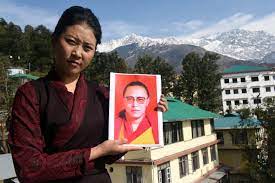
Nyima Lhamo holding a photo of Tenzin Delek Rinpoche
Alongside Nancy Pelosi, Tibetan former political prisoner Nyima Lhamo testified; she is the niece of revered Tibetan lama Tenzin Delek Rinpoche who died under suspicious circumstances in a Chinese prison in 2015. Nyima Lhamo said it is “urgent that we raise our voices today for those who have been silenced by the Chinese Communist Party[…] Beijing is putting on a friendly face for the Olympics, but that isn’t their real face. The Tibetan people have seen who they really are”.
There is great concern for the safety and well being of top Chinese tennis player Peng Shuai who some months ago made an allegation of sexual assault against a former senior politician on the Chinese social media site Weibo. She disappeared in the wake of her allegation and subsequently made public appearances retracting her statement. The events have caused an outcry of concern for her, and for the implications for other Chinese athletes and her fans are wearing T-shirts emblazoned with the words “Where is Peng Shuai?”.
The Japanese parliament passed a resolution in its lower chamber on the “serious human rights situation” in China just days ahead of the opening ceremony, which read, “Human rights issues cannot just be domestic issues, because human rights hold universal values and are a rightful matter of concern for the international community”. The resolution is reported to have highlighted the concerns expressed by “the international community over issues such as internment and the violation of religious freedom in the Xinjiang Uyghur Autonomous Region, Tibet and Hong Kong”, and calls for the Japanese government to work with the international community in addressing the issue.
Reporting restrictions for journalists working in China is well documented, but the Tibetan Review reports that “in the runup to the Games Foreign journalists working in China complain of sharp rise in intimidation, other abuses”; the BBC has said that media freedom in China is “now declining further at breakneck speed”, citing the Foreign Correspondents Club of China (FCCC) who report that journalists face physical assaults, hacking, online trolling and visa denials. The FCCC report continues, saying that foreign journalists were being harassed so severely by the communist party state that some had to leave the country. Chinese journalists face harassment of their families and even detention in prison.
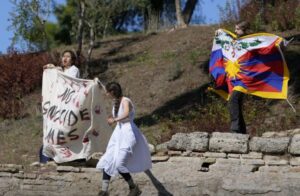 And in Greece, the trial of three activists who interrupted the Olympic torch-lighting ceremony in October, and which was due to be held the day before the opening ceremony, has been postponed until the end of this year. Human rights lawyers and activists have accused the Greek court of trying to “avoid embarrassing China” on the eve of the Games.The three activists unfurled a Tibetan flag and “No Genocide Games” banner at the torch-lighting ceremony, saying that the International Olympics Committee was complicit in human rights violations by giving the Winter Olympics to China, and to call for a total boycott of the Beijing Olympics, citing China’s ongoing “crimes against humanity”, cultural repression of Tibetans and political crackdown. The face charges of attempting to “pollute, damage, and distort” a historical monument, a charge punishable up to five years imprisonment under Greek law.
And in Greece, the trial of three activists who interrupted the Olympic torch-lighting ceremony in October, and which was due to be held the day before the opening ceremony, has been postponed until the end of this year. Human rights lawyers and activists have accused the Greek court of trying to “avoid embarrassing China” on the eve of the Games.The three activists unfurled a Tibetan flag and “No Genocide Games” banner at the torch-lighting ceremony, saying that the International Olympics Committee was complicit in human rights violations by giving the Winter Olympics to China, and to call for a total boycott of the Beijing Olympics, citing China’s ongoing “crimes against humanity”, cultural repression of Tibetans and political crackdown. The face charges of attempting to “pollute, damage, and distort” a historical monument, a charge punishable up to five years imprisonment under Greek law.




 Print
Print Email
Email